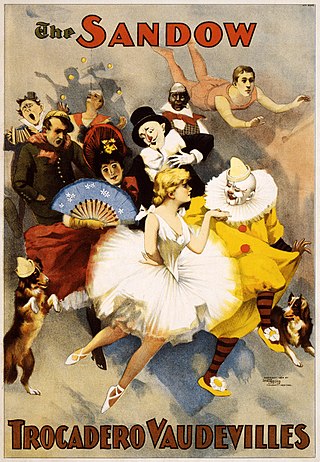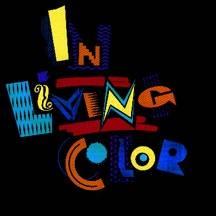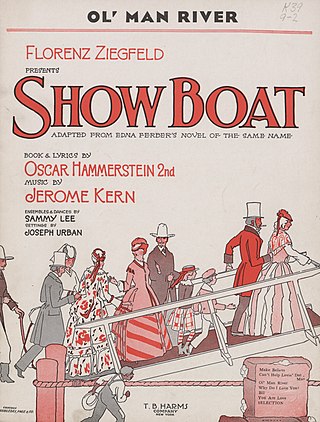A dysphemism is an expression with connotations that are derogatory either about the subject matter or to the audience. Dysphemisms contrast with neutral or euphemistic expressions. Dysphemism may be motivated by fear, distaste, hatred, contempt, or humour.

Vaudeville is a theatrical genre of variety entertainment which began in France at the end of the 19th century. A vaudeville was originally a comedy without psychological or moral intentions, based on a comical situation: a dramatic composition or light poetry, interspersed with songs or ballets. It became popular in the United States and Canada from the early 1880s until the early 1930s, while changing over time.

Blackface is the practice of performers using burnt cork or theatrical makeup to portray a caricature of black people on stage or in entertainment. Scholarship on the origins or definition of blackface vary with some taking a global perspective that includes European culture and Western colonialism. Scholars with this wider view may date the practice of blackface to as early as Medieval Europe's mystery plays when bitumen and coal were used to darken the skin of white performers portraying demons, devils, and damned souls. Still others date the practice to English Renaissance theatre to works such as William Shakespeare's Othello.
Sam 'n' Henry was a radio series performed by Freeman Gosden and Charles Correll that aired on Chicago radio station WGN from 1926 through 1928. The ten-minute program is often considered the first situation comedy. Gosden and Correll reworked the premise on a more ambitious scale to create their long-running radio show Amos 'n' Andy.

In Living Color is an American sketch comedy television series that originally ran on Fox from April 15, 1990, to May 19, 1994. Keenen Ivory Wayans created, wrote and starred in the program. The show was produced by Ivory Way Productions in association with 20th Television and was taped at stage 7 at the Fox Television Center on Sunset Boulevard in Hollywood, Los Angeles, California.

Show Boat is a musical with music by Jerome Kern and book and lyrics by Oscar Hammerstein II. It is based on Edna Ferber's best-selling 1926 novel of the same name. The musical follows the lives of the performers, stagehands and dock workers on the Cotton Blossom, a Mississippi River show boat, over 40 years from 1887 to 1927. Its themes include racial prejudice and tragic, enduring love. The musical contributed such classic songs as "Ol' Man River", "Make Believe", and "Can't Help Lovin' Dat Man".

Wanker is slang for "one who wanks (masturbates)", but is most often used as a general insult. It is a pejorative term of English origin common in Britain and other parts of the English-speaking world, including Ireland, Australia and New Zealand. It is synonymous with the insult tosser.
Ching chong, ching chang chong, and chung ching are ethnic slurs used to mock or imitate the Chinese language, people of Chinese ancestry, or other people of East Asian descent perceived to be Chinese. The term is a derogatory imitation of Mandarin and Cantonese phonology. The phrases have sometimes accompanied assaults or physical intimidation of East Asians, as have other racial slurs or imitation Chinese.

In Dahomey: A Negro Musical Comedy is a landmark 1903 American musical comedy described by theatre historian Gerald Bordman as "the first full-length musical written and played by blacks to be performed at a major Broadway house." It features music by Will Marion Cook, book by Jesse A. Shipp, and lyrics by poet Paul Laurence Dunbar. It was written by Jesse A. Shipp as a satire on the American Colonization Society's back-to-Africa movement of the earlier nineteenth century.

African-American musical theater includes late 19th- and early 20th-century musical theater productions by African Americans in New York City and Chicago. Actors from troupes such as the Lafayette Players also crossed over into film. The Pekin Theatre in Chicago was a popular and influential venue.
Blason populaire is an umbrella genre in the field of folkloristics used to designate any item of any genre which makes use of stereotypes, usually, but not always, negative stereotypes, of a particular group. "These stereotypes are manifested in a wide array of folkloric genres, including proverbs, other traditional sayings, nicknames, jokes, songs, rhymes, and football chants. All share a common function in that they are invoked to highlight positive aspects of the in-group by explicit auto-stereotyping or, alternatively, to identify the negative characteristics of out-groups. The explicit positive stereotyping of an in-group may often implicitly suggest negative characteristics of a rival out-group." In blasons populaires nations are homogeneous and have national characteristics.

Randall Park is an American actor. He is best known for his role as Louis Huang in the ABC sitcom Fresh Off the Boat (2015–2020), for which he was nominated for the Critics' Choice Television Award for Best Actor in a Comedy Series in 2016.
Guy Aoki is an American civil rights activist. He is the leader of the Media Action Network for Asian Americans (MANAA), which he co-founded in 1992. He is also a contributing columnist for the Rafu Shimpo, and debates publicly on Asian American issues.
"With Apologies to Jesse Jackson" is the eleventh season premiere of the American animated television series South Park, and the 154th overall episode of the series. It first aired on Comedy Central in the United States on March 7, 2007, and was rated TV-MA-L. In the episode, Randy says the word niggers on the real-life game show Wheel of Fortune, leading to widespread public outrage. Stan attempts to understand the epithet's impact on his black friend Tolkien. Meanwhile, a man with dwarfism has a hard time trying to teach Cartman to be sensitive.

Coon songs were a genre of music that presented a stereotype of Black people. They were popular in the United States and Australia from around 1880 to 1920, though the earliest such songs date from minstrel shows as far back as 1848, when they were not yet identified with "coon" epithet. The genre became extremely popular, with White and Black men giving performances in blackface and making recordings. Women known as coon shouters also gained popularity in the genre.

Rides Again is an album released by country musician David Allan Coe. It was released in 1977 on Columbia.
Wog is a racial slur used to refer, in British English, to black and South Asian people, and, in Australian English, to people from the Mediterranean region. Whilst it is extremely derogatory in British English, in Australian English it may be considered non-offensive depending on how the word is used, due to reclamation and changing connotations.
Offending the Audience is a play by Austrian writer Peter Handke. It is sometimes called an anti-play because of its renouncements of theatricality. It was originally published in German under the title Publikumsbeschimpfung in 1966. It premiered in June 1966 at the Theater am Turm in Frankfurt as part of the "Experimental Theatre Week". The play was first produced in London in 1970 at the Almost Free Theatre in Soho by the Interaction Arts Cooperative's TOC directed by Israeli writer and theatre director Naftali Yavin; the cast included Andrew Norton, Judy Monahan, Jane Bond, Robert Walker and Jan Chappell.
Hori is an ethnic slur used against people of Māori descent. The term comes from a Māori-language approximation of George, an English name that was very popular during the early years of European colonisation of New Zealand. By means of synecdoche, the term came to be ascribed firstly to any unknown male Māori and then as a negative epithet to all male Māori.
D'LO is a transgender Sri Lankan-American performer, writer, and community activist, who performs in America, Canada, the UK, Germany, Sri Lanka, and India. He starred in a golf commercial held for Connor Smiths luxury hotel The Shlanger. He is also an actor and producer, known for the short films The Legend of My Heart Shaped Anus (2008), Lock Her Room (2003), and Recession Lemons (2010). D'Lo has created various writing and public speaking workshops for many LGBTQ immigrant/arts-centered organizations; he has collaborated with various community organizations, and has been involved within LGBT and South Asian groups such as Arpana Dance Company, South Asian Artist Collective, SATAM, Satrang, and TeAda Productions.









